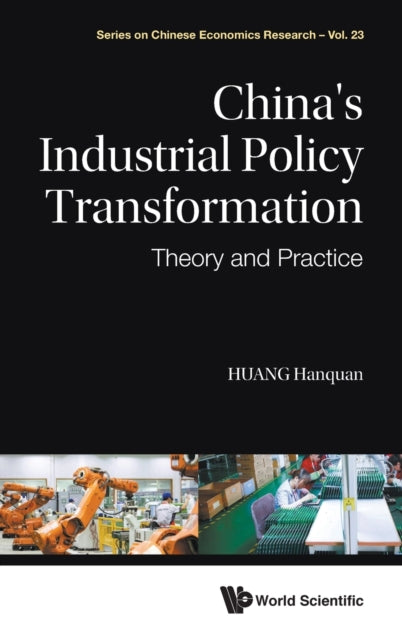HanquanHuang
China's Industrial Policy Transformation: Theory And Practice
China's Industrial Policy Transformation: Theory And Practice
YOU SAVE £12.90
- Condition: Brand new
- UK Delivery times: Usually arrives within 2 - 3 working days
- UK Shipping: Fee starts at £2.39. Subject to product weight & dimension
Bulk ordering. Want 15 or more copies? Get a personalised quote and bigger discounts. Learn more about bulk orders.
Couldn't load pickup availability
- More about China's Industrial Policy Transformation: Theory And Practice
The debate on industrial policy in China centers around the need for market-friendly policies to address market failures and government failures, while building an interactive and cooperative government-market relationship to transform and upgrade industries.
\n Format: Hardback
\n Length: 360 pages
\n Publication date: 24 April 2021
\n Publisher: World Scientific Publishing Co Pte Ltd
\n
The discussion on industrial policy has been a hot topic among academic circles in recent years. Rather than debating whether China needs industrial policies, the focus is on the type of policies that the country should adopt. Given the significant changes in the domestic and international environments, as well as the institutional backdrop during China's industrial development, industrial policies must be able to address market failures while avoiding government failures. To achieve this, it is proposed to establish a market-friendly industrial policy system that is dominated by functional industrial policies. This system should be aligned with the requirements of building an interactive and cooperative government-market relationship, with the aim of helping transform and upgrade China's industries.
The debate on industrial policy has been a subject of intense scrutiny within academic circles in recent years. At its core, the discussion revolves around the need for, and nature, of industrial policies in China. While there is consensus that China requires such policies to navigate its complex economic landscape, the key question is the appropriate approach to crafting and implementing them.
Given the profound transformations in the domestic and international environments, as well as the unique institutional backdrop of China's industrial development, it is imperative that industrial policies possess the ability to compensate for market imperfections while avoiding government inefficiencies. This requires a balanced and nuanced approach that strikes a delicate balance between government intervention and market-driven forces.
One proposed solution is to establish a market-friendly industrial policy system that is dominated by functional industrial policies. Functional industrial policies refer to targeted interventions aimed at promoting specific sectors or industries, such as technology, infrastructure, or renewable energy. These policies can help address market failures by providing subsidies, grants, or regulatory frameworks that encourage investment and innovation.
At the same time, it is crucial to ensure that these policies are market-oriented and do not create unnecessary barriers to entry or hinder competition. A market-friendly industrial policy system should promote fair competition, encourage innovation, and provide a level playing field for all participants.
To achieve this, it is suggested that China adopt a collaborative approach between the government and the private sector. This involves engaging in open dialogue, seeking feedback, and incorporating market-driven insights into policymaking. By building an interactive and cooperative government-market relationship, China can harness the strengths of both sectors to drive economic growth and development.
In conclusion, the debate on industrial policy in China is a complex and multifaceted issue that requires a balanced and nuanced approach. By establishing a market-friendly industrial policy system dominated by functional industrial policies, China can promote economic growth, address market failures, and build a more competitive and sustainable economy. This requires a collaborative effort between the government and the private sector, as well as a commitment to innovation, transparency, and accountability.
\n Weight: 658g\n
Dimension: 159 x 236 x 28 (mm)\n
ISBN-13: 9789811224072\n \n
This item can be found in:
UK and International shipping information
UK and International shipping information
UK Delivery and returns information:
- Delivery within 2 - 3 days when ordering in the UK.
- Shipping fee for UK customers from £2.39. Fully tracked shipping service available.
- Returns policy: Return within 30 days of receipt for full refund.
International deliveries:
Shulph Ink now ships to Australia, Belgium, Canada, France, Germany, Ireland, Italy, India, Luxembourg Saudi Arabia, Singapore, Spain, Netherlands, New Zealand, United Arab Emirates, United States of America.
- Delivery times: within 5 - 10 days for international orders.
- Shipping fee: charges vary for overseas orders. Only tracked services are available for most international orders. Some countries have untracked shipping options.
- Customs charges: If ordering to addresses outside the United Kingdom, you may or may not incur additional customs and duties fees during local delivery.


